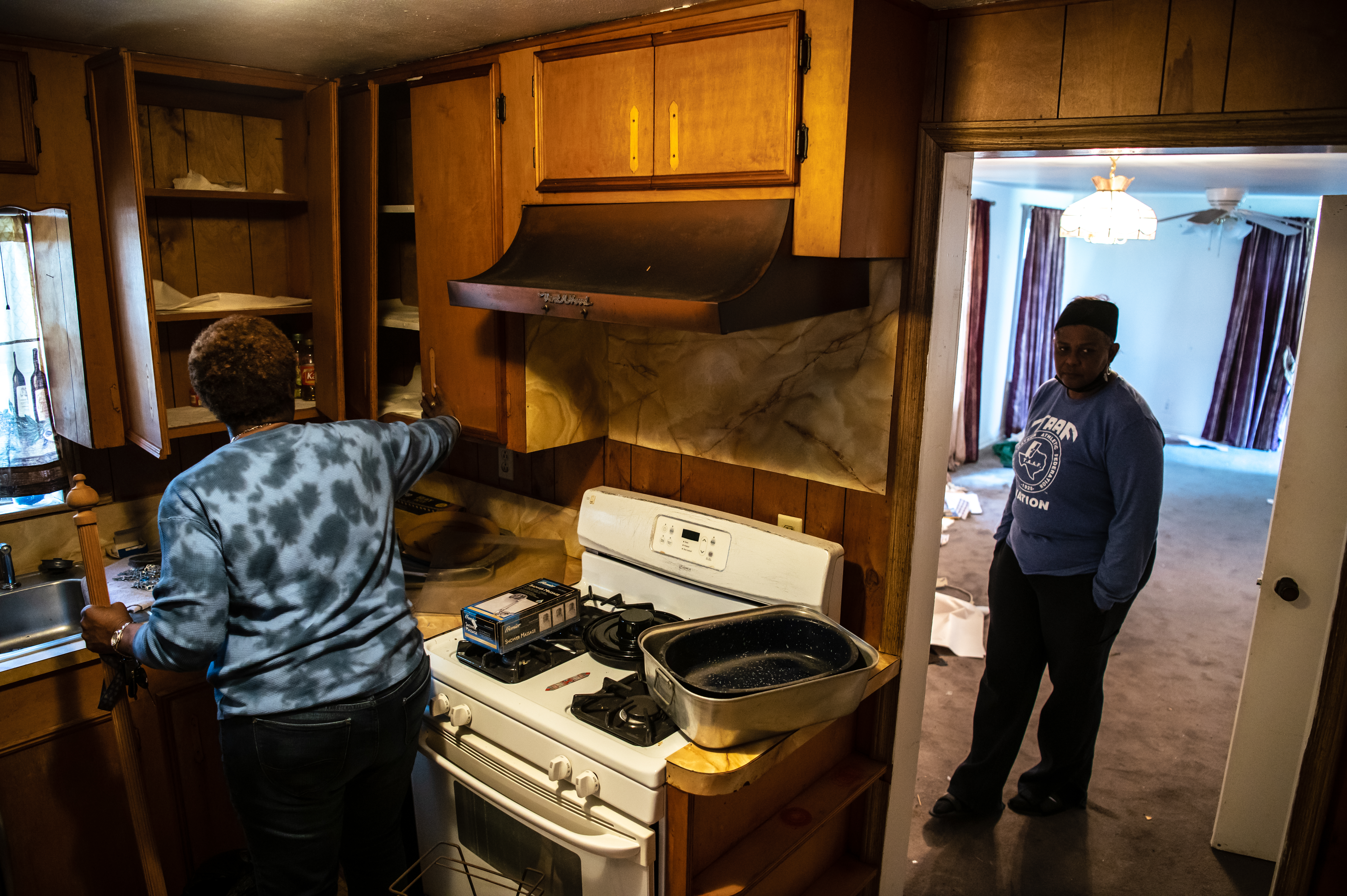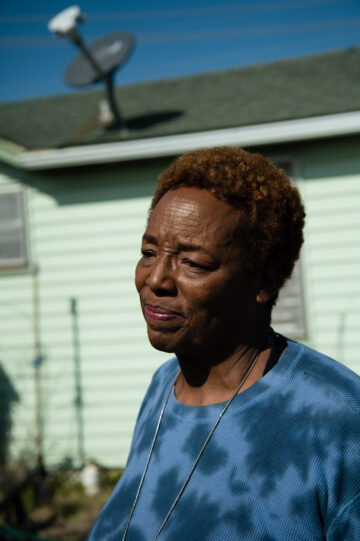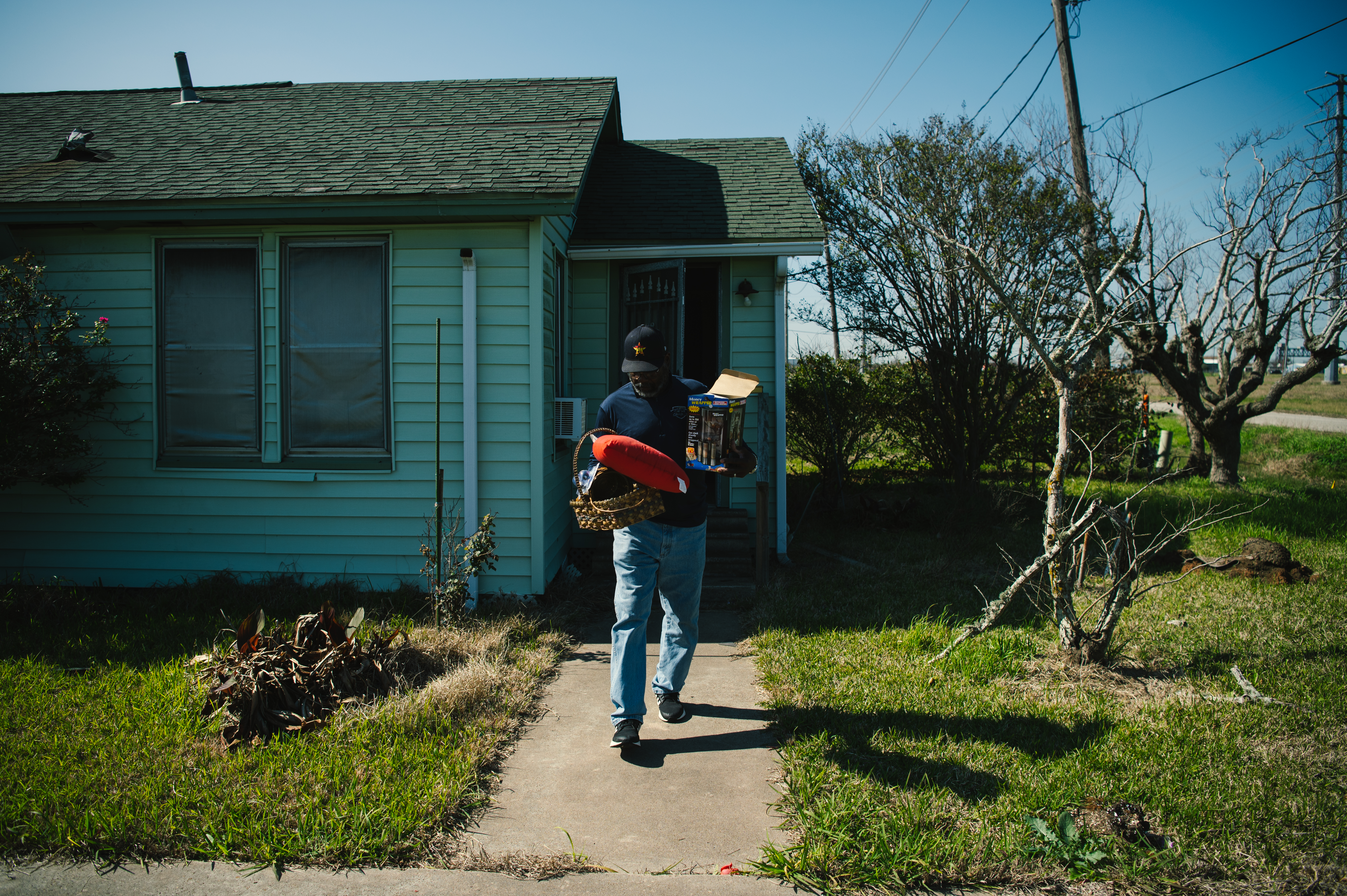In the small Gulf Coast city of Freeport, a pretty mint-green house stands alone in a neighborhood called the East End, surrounded by what looks at first glance like a meadow. Closer examination reveals the grass is growing over recently emptied lots where other houses once stood. Now driveways lead to nowhere.
Pam Tilley, a retired military nurse who grew up here, returned in February to see her childhood home one last time. She was there to clear out her 98-year-old father Henry Jones’ belongings. Calendars on the wall were still turned to February 2020, the last full month anyone lived there. For the past three years, Jones has been living with another daughter in the Houston suburb of Katy, originally because of the COVID-19 pandemic but now because he no longer owns this home.
The commissioners of nearby Port Freeport have condemned Tilley’s family property by eminent domain. The port is expanding to accommodate bigger Panamax container ships, and has been buying up the East End bit by bit. Any day, the mint-green house will be demolished as its neighbors have been.
The neighborhood, until recently a vibrant community, was initially formed by segregation of the city’s Black residents in the 1930s into a few square blocks. When Tilley was growing up, the modus operandi was that “you have to live here or nowhere,” she said. She remembers that older African-American residents like her parents felt, “if we have to live here, it’s going to be the best community ever.” They made the best of the situation, and turned the East End into a happy place to live.
Back in 2017, lawyers for the nonprofit Lone Star Legal Aid stepped in to help residents make a federal civil rights complaint against Port Freeport, as well as the City of Freeport, to several federal agencies that have provided funding to the port and the city. The Department of Homeland Security finally agreed to investigate the case last year.
But the process has taken so long that almost everybody from this close-knit community is already gone. It was like being “one of the last on the planet,” Tilley said. Only one other family from her tight-knit African-American community remains at home.
A few East End families still have individual lawsuits pending against Port Freeport. Tilley and her family were set to go to court earlier this month in an effort to dispute the port’s valuation of Henry Jones’ home. Instead, after years of contentious negotiation, the family and the port recently reached a settlement, which Tilley called “forced.” She would have preferred to be heard in court, but her family was worn out from years of fighting.

With barely any residential properties left to fight over, Port Freeport has now turned against the city itself, asserting eminent domain over city-owned park land, streets, and infrastructure in the neighborhood. When city officials fought the condemnation, the port escalated the battle over Freeport’s East End earlier this year to the Texas Legislature and got Representative Cody Vasut, a Republican from Angleton, to file House Bill 5336: a bill that would give much of the city’s regulatory authority over to the port instead. The bill was scheduled for a public hearing in the House Transportation Committee on Wednesday.
The passage of such a targeted bill against the City of Freeport, introduced specifically at the behest of Port Freeport, could set a precedent for other port communities around Texas that want to limit industrial development and preserve residential neighborhoods. It will also determine how easily the port can pursue future expansions in other areas of Freeport.
The East End is surrounded on three sides by the port and by fossil fuel and chemical plants—including BASF, Dow, Freeport LNG, Huntsman, Phillips 66, SI Group, and Gladieux Metals Recycling (formerly Gulf Chemical, which notoriously hid its pollution and flouted state air and water quality rules for years). By the 2010s, 71 percent of neighborhood residents identified as Hispanic and 15 percent as African-American.
Like many other communities of color in the United States, the East End long suffered from industrial pollution. Today, that sacrifice is stretching to its extreme, with the neighborhood almost completely swallowed up by the port.
Port Freeport’s management wants the port to become the “largest deep water landlord port on the gulf coast of Texas,” according to the 2017 civil rights complaint by Lone Star Legal Aid, making room for even more gargantuan Panamax ships following the 2016 expansion of the Panama Canal, as well as anticipating more traffic in the region due to oil and gas exports from the Eagle Ford Shale.
“All up and down the coast, all the ports, it’s like a race to see who can get deepened and widened first. And unfortunately, right now, Port Freeport is in the lead,” said local environmental activist Melanie Oldham, who founded Citizens for Clean Air and Water of Freeport and Brazoria County.
“This community was just being erased.”
The port has been buying property in the East End for more than 20 years, according to a 2021 op-ed in the Brazosport Facts by Port Freeport CEO Phyllis Saathoff. (A port spokesperson emailed an excerpt of that op-ed to the Texas Observer in response to questions about the civil rights complaint.) Port Freeport acquired more than 80 percent of these properties through voluntary deals, according to Saathoff. “Each and every offer to residential property owners was made in good faith, at a fair market value, and in addition to the relocation support,” she wrote. In 2015, the port added an option for landowners to exchange their East End properties for newly built homes elsewhere.
It’s too late to save most of the neighborhood’s homes. But Amy Dinn, one of the Lone Star Legal Aid attorneys who made the 2017 civil rights complaint, is hopeful that the Department of Homeland Security’s investigation will result in something, which would be “better than what was happening before, which was nothing,” she said. “This community was just being erased.” Dinn is based in Houston; but the nonprofit also has an office in Brazoria County.
Most civil rights investigations end in informal resolutions, Dinn explained. Reaching an informal resolution in Freeport would save the port’s and the city’s abilities to receive federal funds while still coming up with justice for residents and landowners. “The real objective is not to penalize them [the port and the city], it is to fix the problem for the East End residents,” she said.
Many former residents want some kind of historic preservation, display, or monument, so the East End community isn’t forgotten. Tilley is hoping the civil rights complaint will at least result in the recording of an oral history of the East End. She’s suggested creating a cookbook with her old neighbors, and has spoken with the Freeport Historical Museum about a display dedicated to the community’s former churches.
The port was able to erase so much of this community so quickly in part because the city denied homeowners permits to repair their houses, according to Lone Star Legal Aid’s civil rights complaint. (Manning Rollerson, the plaintiff in a lawsuit related to this complaint, previously told the Observer he had to demolish his family’s East End house after being denied such a permit.) Many other residents have complained about the city refusing to repair roads and install sidewalks in the neighborhood.
“In a nutshell, East End taxpayers are paying for city services, but not receiving them,” Dinn and her colleagues wrote in the civil rights complaint. “The City have worked expressly against the homeowners of the East End and tipped the scales in favor of the Port’s expansion.”

But the City of Freeport has at times opposed Port Freeport, refusing to sell city-owned property in the East End. As a result, the port asserted eminent domain over the city as well. City officials are disputing the port’s appraised value of just over $4 million for its property in the neighborhood, and city and port are due to face off in Brazoria County Court on May 11.
Meanwhile, early this year Port Freeport quietly moved toward the nuclear option. Port commissioners voted in February to start lobbying state legislators to introduce a bill that would force the City of Freeport to deannex, or give up as part of the city, the entire East End to the port. The city only learned about this effort when Melanie Oldham, who meticulously tracks industry in the region, brought news of the port’s plans to the Freeport City Council.
Under threat of this bill, city council members acquiesced to mediation sessions with port officials. As a result, Vasut introduced somewhat toned-down legislation that would not force the city to deannex the East End, but would separate Freeport into a “port zone” and a “protected zone” for the city, while taking away much of the city’s power to regulate port activity.
“Port Freeport must be allowed to proceed with the public purposes for which it was created – to facilitate waterborne commerce and to responsibly develop projects that create jobs and economic opportunities for all residents of Brazoria County,” a port spokesperson wrote via email to the Observer. “The bill, as proposed, balances the Port’s mission to provide economic opportunities in a highly competitive environment while assuring the citizens that the Port’s future expansion will be limited and predetermined.”
The mediation sessions also produced a proposed interlocal agreement in which Port Freeport offered nearly $10 million for the same city property it was attempting to condemn through eminent domain. At a city council meeting on Monday, council members were evenly split on whether to adopt this agreement. Mayor Brooks Bass ultimately cast the deciding vote to reject the proposal.
“Just because they make an offer doesn’t mean I have to accept it,” the mayor said. The proposed agreement included language supporting HB 5336, which he adamantly opposed. Giving the port power to issue its own permits would be “a major transgression into a city’s ability for oversight,” he said. Bass described Port Freeport turning to the Legislature in the middle of eminent domain proceedings as changing the rules of the game, an action taken in bad faith. “It just didn’t pass the smell test,” he said.
The looming threat of Port Freeport’s expansion caused many people to leave the East End even before the port asserted eminent domain—making Lone Star Legal Aid question whether sellers involved in earlier voluntary deals with the port were truly willing, or simply afraid of the port seizing their land later for less money. “The Port has sought to acquire East End properties with the threat of condemnation as its hammer,” the lawyers wrote.
A cloud of “eminent domain blight” has hung over the East End for years, said Chris Johns, an attorney who has taught property rights law at the University of Texas at Austin and is now representing Tilley’s family in their individual lawsuit against Port Freeport, the government entity that runs the port itself. This eminent domain cloud, which lowered property values in the neighborhood and resulted in families being underpaid for their properties, can make it difficult for property owners to find comparable homes elsewhere, Johns said.
A similar story is often repeated near other ports and government property across Texas and across the country, he added. “A lot of these takings tend to target minority communities. … There’s a lot of potential for abuse and people taking advantage of other people and disbanding strong minority communities.”
“There’s a lot of potential for abuse and … disbanding strong minority communities.”
On paper, both the United States and Texas constitutions say landowners should receive “just compensation” when their property is taken by the government. In reality, just compensation is “a fiction,” according to Johns. Families pay for attorneys, expert witnesses, and court fees, all of which subtract from the price they ultimately get for their properties—properties already devalued by eminent domain blight and disinvestment.
After initially being offered less than $100,000 for their property, Tilley’s family fought the process.
“We just want justice,” Tilley said. What galled her was that after Port Freeport seized the East End homes, it would get much more economic value from that land than what it was offering her father and other property owners.
“They do what they want around here,” Tilley said of the port. “They have literally stolen the community to facilitate what they want.”
But even now, with just a few houses still standing, the East End community still exists in the ongoing tradition of neighbors helping neighbors. Henry Jones’ shotgun-style house was originally built by his brother, Tilley’s uncle, and expanded over the years to accommodate a growing family. One neighbor built the kitchen cabinets, and another put in plumbing. Tilley herself picked out the hallway’s floral wallpaper and laid colorful bathroom tiles. And this February, Kenny Roberts, who also grew up in the neighborhood, joined Pam Tilley to help her clear out the house. Roberts is something of an inside man—he won a bid from the Port of Freeport to remove ceiling fixtures from houses condemned by eminent domain.
During their recent visit, one special fixture remained in the Jones house for Roberts to remove: a small chandelier picked out by Tilley’s mother, with a beautiful pink and white stained-glass shade. The chandelier once hung above the family’s dining table, which had already been moved out. Below its light, only a carpet strewn with odds and ends remained.
After leaving the house, Tilley’s thoughts remained on her father, now living far away. “You talk about a man’s life: He’s soon to be 99, and 70 years of his life is spent on that property,” she said. “You’ve taken a man’s life.”

Editor’s note: This story originally stated that Lone Star Legal Aid attorneys from around Texas were involved in making a civil rights complaint on behalf of Freeport residents. Though the nonprofit has several offices, the attorneys involved are or were all based in Houston.







